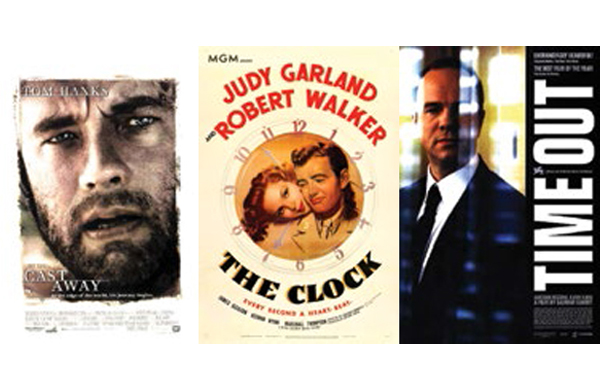Snuggle up and enjoy these insightful and delightful picks that comment on our time.
Cast Away (2002)
A man is stranded alone on an island, left to his own devices … for years. The Robinson Crusoe scenario sounds like a yarn from centuries past, but this adventure is happening to an ill-equipped man of the year 2000 — that’s part of Cast Away’s strangely exhilarating dislocation. Tom Hanks plays the plane-crash survivor, whose attempts to adjust to his uncivilized new world play out in sometimes painstaking detail; one of director Robert Zemeckis’ inspired choices here is to show us just how long it takes to, say, crack open a coconut when you have no tools at your disposal. The film also plays with how time passes for people back in the hustle-bustle real world and how the nature of time is very different in the two places. Zemeckis does to the viewer what he does to his hero: He makes us feel time in a new way.
The Clock (1945)
There’s a war on, and soldier Joe (Robert Walker) has just two days on leave in New York City before he ships out. He meets spunky Alice (Judy Garland), and they proceed to make the most of these truly precious hours. In tackling this 1945 project, director Vincente Minnelli realized he would need to make NYC the third main character and let his gifted actors improvise a little around the story. It’s an irresistibly romantic conception, a lovely home-front escapade with a poignant undertow: How do you spend the time in your life, especially when reminded so insistently of its fragility? The delightful supporting cast includes the great character actor James Gleason and his real-life wife Lucile, plus Keenan Wynn in a show-stopping drunk scene. Walker and Garland — two troubled but very special actors — create uniquely intimate chemistry together. And if Garland seems unusually vibrant here, it’s because she and Minnelli were falling in love off-camera, to be wed shortly after filming ended.
Time Out (2001)
When Vincent (played by the resolutely ordinary-looking actor Aurelien Recoing) is laid off from his comfortable white-collar job, he can’t bring himself to tell his wife and family. He continues heading off to “work” every day, milling around office buildings, waiting in lobbies for meetings that never come, and calling his wife from business trips. As a matter of fact, he assumes a rather more important position than he had before — why not say he works for the United Nations? What seems at first like a comic premise gives way to a subtly disturbing snapshot of what might happen when an empty vessel like Vincent is confronted with the sheer volume of time (we can also appreciate the irony that his fake working life doesn’t look all that different from the real working life of a middle-management paper-pusher like Vincent). Director Laurent Cantet takes a dreamlike approach to this 2001 film so that we really feel the dissolving of all those formerly regimented hours and what might happen when someone is incapable of filling them.



